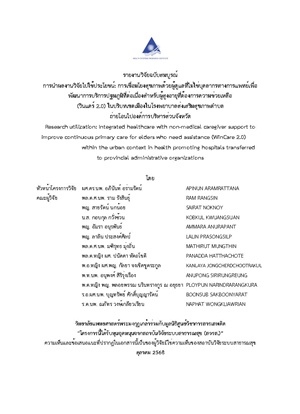บทคัดย่อ
โครงการวิจัยนี้มุ่งพัฒนารูปแบบวินแคร์ (WinCare) อาสาสมัครผู้ดูแลที่ไม่ใช่บุคลากรทางการแพทย์ เพื่อเสริมการดูแลผู้สูงอายุโรคเรื้อรังที่อยู่อาศัยลำพังและมักขาดการติดตามอาการ การใช้ยา และการปรับพฤติกรรมให้สอดคล้องกับแผนการรักษา วัตถุประสงค์เพื่อพัฒนากลไกการเชื่อมโยงสุขภาพผ่านวินแคร์ในหน่วยบริการปฐมภูมิที่ถ่ายโอนภารกิจสู่องค์กรปกครองส่วนท้องถิ่นในเขตเมือง และเปรียบเทียบผลลัพธ์ด้านสุขภาพและคุณภาพชีวิตก่อน–หลัง รวมถึงระหว่างกลุ่มวินแคร์กับกลุ่มควบคุม การดําเนินงานระยะ 4 เดือน (พฤษภาคม–สิงหาคม 2568) ณ โรงพยาบาลส่งเสริมสุขภาพตำบลเพ (องค์การบริหารส่วนจังหวัดระยอง) และศูนย์บริการสาธารณสุขวัดโสภณ (เทศบาลนครมาบตาพุด) คัดเลือกวินแคร์หน่วยละ 8 คน ต้องมีพาหนะ ใช้งานสมาร์ตโฟนได้ และผ่านการอบรมภารกิจที่ไม่ใช่การแพทย์ ได้แก่ การวัดความดันโลหิต การชั่งน้ำหนัก การเตือนการใช้ยา/การนัดหมาย การให้คำแนะนำสุขภาพและการเฝ้าสังเกตอาการ โดยเยี่ยมบ้านสัปดาห์ละ 1 ครั้ง บันทึกผลแบบเรียลไทม์ผ่านแอปพลิเคชันวินแคร์และสื่อสารด้วยไลน์ วินแคร์ 1 คนดูแลเฉลี่ยราว 5 ราย พร้อมค่าตอบแทนเดือนละ 1,500 บาท กลุ่มวินแคร์มีผู้ป่วยสูงอายุ 74 ราย เปรียบเทียบกับกลุ่มควบคุม 61 ราย ผลการศึกษาพบว่าโมเดลวินแคร์ปลอดภัย ปฏิบัติได้จริง และไม่ทับซ้อนบทบาทของอาสาสมัครสาธารณสุขประจำหมู่บ้าน (อสม.) ภายใน 4 เดือน ผู้ป่วยกลุ่มวินแคร์มีการควบคุมความดันโลหิตและสถานะสุขภาพดีกว่ากลุ่มควบคุมอย่างมีนัยสําคัญ ข้อมูลเชิงคุณภาพสะท้อนความภาคภูมิใจและความรอบคอบของวินแคร์ ความต้องการผู้ดูแลของผู้ป่วย และความเหมาะสมของความถี่การเยี่ยม สรุปได้ว่า วินแคร์เป็นกลไกระดับชุมชนที่มีประสิทธิผล เสริมความต่อเนื่องของบริการปฐมภูมิ สร้างความไว้วางใจ และยกระดับการดูแลผู้สูงอายุโรคเรื้อรังในชุมชนเมือง
บทคัดย่อ
This study developed and e valuated “WinCare,” a model that deploys
trained non-medical volunteer caregivers to strengthen continuous primary care for
older adults with chronic diseases who often live alone and struggle with symptom
monitoring, medication adherence, and lifestyle adjustments. Conducted with support
from the Health Systems Research Institute, the project targeted urban primary care
units transferred to local administrative organizations and compared health outcomes
before–after implementation and between intervention and control groups. Over four
months (May–August 2015) in Rayong Province—the Phe Subdistrict Health-Promoting
Hospital and the Wat Sopan Public Health Service Center—eight volunteers per unit
were recruited from local residents with altruism, transportation, and smartphone
proficiency. After training in non-medical tasks (blood pressure and weight
measurement, medication and appointment reminders, basic health advice, and
recognition of warning symptoms), volunteers made weekly home visits, recorded
findings in real time via the WinCare application, and coordinated through LINE. Each
volunteer cared for ~5 patients and received a stipend of 1,500 THB/month. In total,
74 older adults received WinCare (36 Phe; 38 Wat Sopan) and were compared with 61
controls (33; 28). Implementation was safe, feasible, and non-duplicative of village
health volunteers or bedridden-patient caregivers. Within four months, the
intervention group showed significantly improved blood pressure control and overall
health status. Qualitative data indicated volunteers’ pride and careful practice, a strong
patient need for caregivers, appropriateness of weekly follow-up, and the value of
routine measurements in providing immediate feedback and building trust. WinCare
represents an effective, community-anchored mechanism that augments primary care
capacity and enables truly continuous care for older adults.


